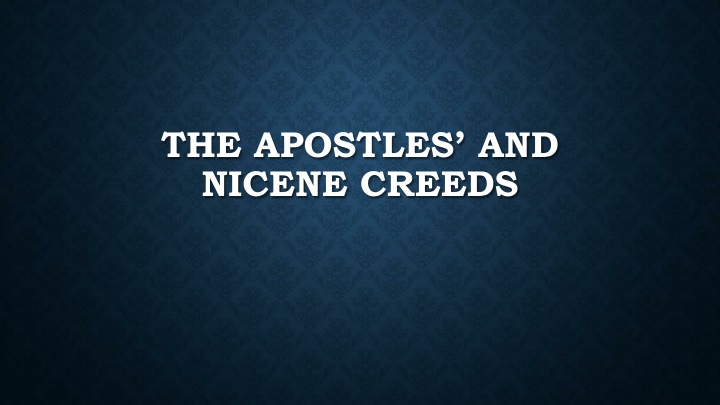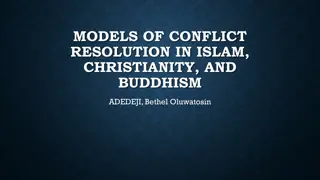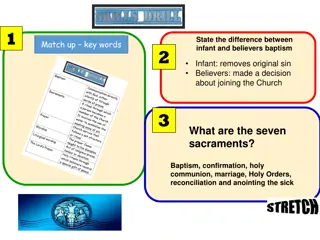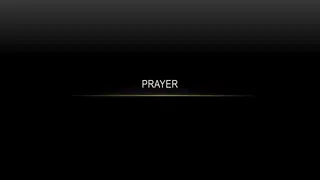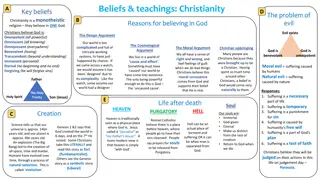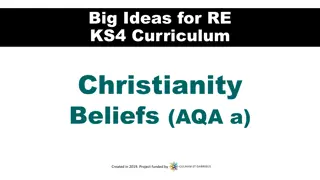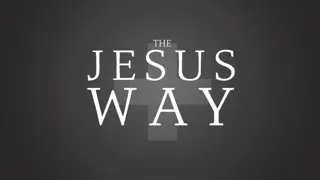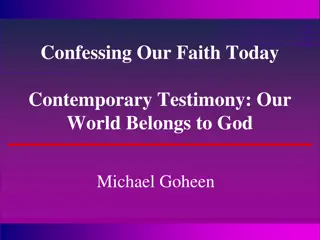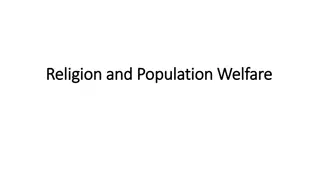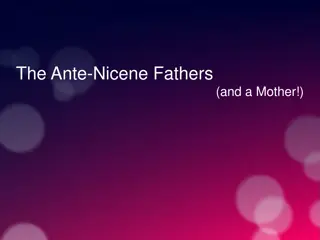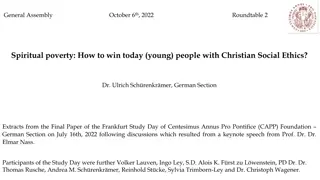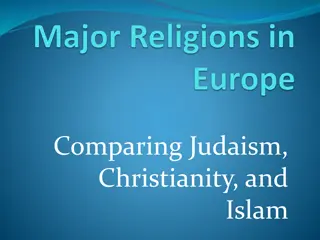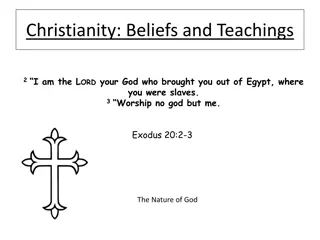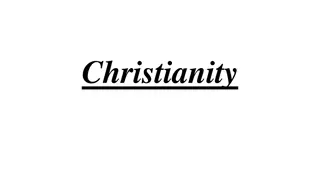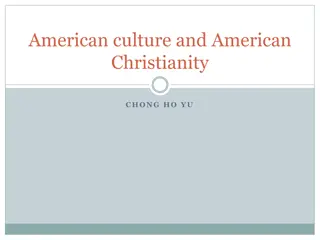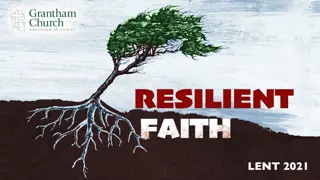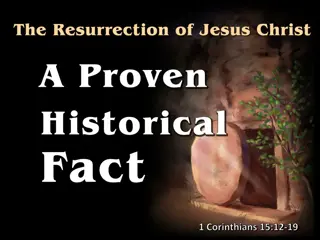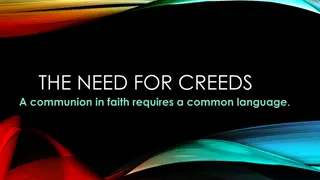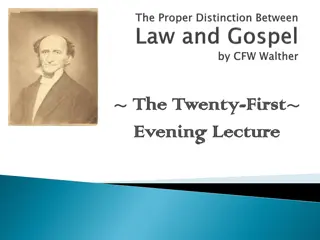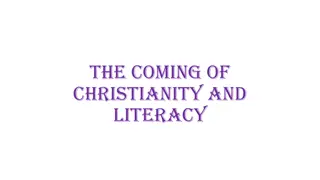Development and Importance of Creeds in Christianity
Creeds in Christianity are statements of faith summarizing beliefs, evolving over time to address controversies. They play a crucial role in uniting believers, affirming faith, and guiding liturgy. The development of creeds involved responses to heresies and a shift from simplicity to complexity. They serve as a common language of faith and are integral to the Church's teachings and rituals.
Download Presentation

Please find below an Image/Link to download the presentation.
The content on the website is provided AS IS for your information and personal use only. It may not be sold, licensed, or shared on other websites without obtaining consent from the author.If you encounter any issues during the download, it is possible that the publisher has removed the file from their server.
You are allowed to download the files provided on this website for personal or commercial use, subject to the condition that they are used lawfully. All files are the property of their respective owners.
The content on the website is provided AS IS for your information and personal use only. It may not be sold, licensed, or shared on other websites without obtaining consent from the author.
E N D
Presentation Transcript
THE APOSTLES AND NICENE CREEDS
WHAT ARE CREEDS? Statements of faith Judaism had the Shema (Deut 6:4-5) Hear, O Israel: The LORD is our God, the LORD alone.You shall love the LORD your God with all your heart, and with all your soul, and with all your might. No strong equivalent in pagan religions belief in gods, not commandments
CREEDS IN EARLY CHRISTIANITY Statements of faith summary, not the totality You are the Messiah, the Son of the living God Mt 16:16 I believe Latin word Credo Apostles Creed Nicene Creed Developed out of controversies Different statements of faith need for clarity The message/content of evangelization Part of baptism, send on mission
HOW DID OUR CREED DEVELOP? Heresies Less ambiguities, brought in Greek philosophy Simple -> complex In the liturgy reaffirms what we believe before we enter into the Eucharistic mystery Structure of our Catechism
SHHHTHATS JUST FOR US There was a great deal of secrecy in the early church about the creed It was handed on orally, just before Baptism . - the catechumens would hand it back at their Baptism . Began to make it s way into the Liturgy, especially the Good Friday liturgy ~7thcentury, started to be required at every Liturgy Need for unity, renewal of the oath that binds the believer to Christ
FROM THE CATECHISM Whoever says "I believe" says "I pledge myself to what we believe." Communion in faith needs a common language of faith, normative for all and uniting all in the same confession of faith. (185) To say the Credo with faith is to enter into communion with God, Father, Son and Holy Spirit, and also with the whole Church which transmits the faith to us and in whose midst we believe: (197) This Creed is the spiritual seal, our heart's meditation and an ever-present guardian; it is, unquestionably, the treasure of our soul. (St. Ambrose)
THE CREED AND THE LITURGY The Creed reaffirms what we believe before we enter into the Eucharistic mystery The Mass is a life-changing even that makes present the One Sacrifice of Christ the Savior which completes and surpasses all Old Covenants. reenacts- the New and Eternal Covenant- demonstrated in God s willingness to enter into a covenant with us in Christ. calls us to renew the way of life we chose in Baptism: a call to trust God who has given us His unconditional love. God calls us to reciprocate His trust, live with a radical trust to live without fear.
THE CREED AND THE LITURGY We are called individually and as community to set aside our doubts and affirming a trusting relationship: In God the Father who created us In Jesus who redeems us through His suffering, death and resurrection In The Holy Spirit who gives us life and teaches us to trust We affirm our trust in the relationship we have in the Church, the people of God the Body of Christ
APOSTLES CREED A legend claimed that each of the 12 articles was written by of the 12 Apostles. For example, Rufinus of Aquileia (345-411) Wrote: So they (i.e, that is the Apostles) met together in one spot, and being filled with the Holy Spirit, compiled this brief token . Each making the contribution he thought fit; and they decreed that it should be handed out as standard teaching to believers Despite its title, there is no evidence the Apostles Creed was actually written by the Apostles, and the legend was largely abandoned by scholars by the time of the Renaissance.
APOSTLES CREED Developed in the last half of the 2ndcentury, one of the earliest summaries of the faith Considered to be a faithful summary of the apostles' faith. It is the ancient baptismal symbol of the Church of Rome - "the oldest Roman catechism (CCC 196) Answers the questions: Who is God? Who is Jesus? Who is the Church? What is salvation? What you believe matters
DISCUSSION Our faith is truly personal if it is also communal Discuss What does it mean to say a moral life of a Catholic is grafted on the Apostles Creed? How would the Catholic Church operate if it didn t have the Apostles Creed? To pray the Creed at Mass is to proclaim a relationship. Discuss
APOSTLES CREED I believe in God, the Father Almighty, Creator of Heaven and earth; and in Jesus Christ, His only Son Our Lord, Who was conceived by the Holy Spirit, born of the Virgin Mary, suffered under Pontius Pilate, was crucified, died, and was buried. He descended into Hell; the third day He rose again from the dead; He ascended into Heaven, and sits at the right hand of God, the Father almighty; from thence He shall come to judge the living and the dead. I believe in the Holy Spirit, the holy Catholic Church, the communion of saints, the forgiveness of sins, the resurrection of the body and life everlasting.
APOSTLES CREED I believe in God, the Father Almighty, Creator of heaven and earth: God is one, the only one God is Father, origin of everything + parental care He created all things, therefore He is outside of creation itself He created Heaven and earth, therefore it is good This is the primary statement of faith in the Creed, everything hinges on this belief.
APOSTLES CREED and in Jesus Christ, His only Son Our Lord: Jesus means God saves in Hebrew; invoke His name for salvation Christ is the Greek translation of the Hebrew word for Messiah God s fatherhood is more than creator/parental to creation, He is Father eternally to His only Son The Sonship of Jesus is particular to Him, different from previous uses Lord indicates divine sovereignty and the same substance as the Father
APOSTLES CREED Who was conceived by the Holy Spirit, born of the Virgin Mary: The mission of the Holy Spirit ordered and joined to that of the Son He sanctifies the womb of Mary for The Word to take on flesh What the Church teaches about Mary points to the teachings on Christ Jesus is a real person, He was born Mary was the virgin of prophecy, therefore Jesus is the The Christ The spousal character of the human vocation in relation to God is fulfilled perfectly in Mary s virginal motherhood (CCC 505) Virginity is transformed no longer shameful
APOSTLES CREED suffered under Pontius Pilate, was crucified, died, and was buried: The narrative can be placed at a specific, historical time, not a vague long time ago The Word became flesh and dwelt with sinners and with saints No focus on Jesus teachings, miracles, etc. entirely on His mission Suffering Crucifixion -- Death He was truly dead, buried
APOSTLES CREED He descended into Hell; the third day He rose again from the dead: descended into Hell brought Salvation to the righteous who died before He experienced death like all men By dying, He brought salvation and conquered death He s alive He s no longer dead! Definitely not a ghost
APOSTLES CREED He ascended into Heaven, and sits at the right hand of God, the Father almighty: Jesus humanity enters into God s heavenly domain Opportunity for all people to participate in the upward movement to glory right hand means the power to govern (ordering all creation) the inauguration of the Messiah's kingdom, the fulfillment of the prophet Daniel's vision (CCC 664)
APOSTLES CREED from thence He shall come to judge the living and the dead: He is the Lord of all things and will pass judgement on all things, especially on The Last Day Everyone is answerable to Him I believe in the Holy Spirit: God is a Trinity,: Father Son and Spirit are one, distinct and inseparable God the Father bestowing on us regeneration through His Son by the Holy Spirit (St. Irenaeus) Romans 8:11 More is said in the Nicene creed
APOSTLES CREED the holy Catholic Church: No accident this follows the statement about the Holy Spirit The Church is the place where the Spirit flourishes Jesus endowed His community with a structure The Church is the means and the goal of God s plan (CCC 778) Christ sanctifies the Church, making her holy Catholic means universal or in keeping with the whole Jesus is present in her, so she has the fullness He provides She is sent on mission by Jesus, called to bring all men into her fold no limits on geography, political, language separations
APOSTLES CREED the communion of saints, the forgiveness of sins, the resurrection of the body and life everlasting. Communion saints is the communion of holy goods and holy persons Shared faith, sacraments, charisms, charity The three states of the Church Militant, Suffering, Triumphant Forgiveness of sins linked to the Holy Spirit, Church and communion of saints The Church was given the power to forgive sins; the first gift after the resurrection The previous statements lead to the belief in the resurrection of the dead on the last day All people will have physical bodies to live in eternity, glorified Good and bad so evangelize!
DISCUSSION What does it mean to you personally when you say, or rather profess: I believe in the Holy Spirit the giver of life? I believe in One Holy Catholic Church? I believe in the resurrection of the body and life everlasting? What do we understand when we say Jesus descended into?
